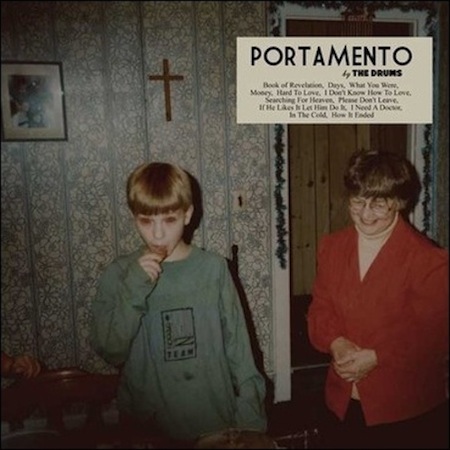The Drums may never live up to the fanfare and anticipation that surrounded their debut album, but on their Sophomore effort Portamento, it seems as though the Brooklyn band have truly come into their own as an important figure in the new wave revival scene. And while the album certainly isn’t life altering, The Drums show an extreme amount of polish and pride in their work, resulting in an album that’s both both coherent and wholehearted.
“And I believe, that when we die, we die.” The chorus repeats this notion on the opening track “Book of Revelation” to the point where you can’t help but address the idea. The stark and rather philosophical nature of track is a welcome addition to The Drums’ usually more irrelevant lyrics, a trend that runs throughout all of Portamento. While each line might not make you ponder death and the abyss like “Book of Revelation,” there’s something rather calming about lead singer Jonathan Pierce’s blunt delivery. The Drums are not pretending to hide behind a veil, but their also not satirical. On “Money,” when Pierce says that “Before I die I want to do something nice… I want to buy you something, but I don’t have any money” there’s a sincere nature to the protagonist’s dilemma; a situation that most of us are all too familiar with. The lyrics are simple but not simple-minded, honest but not conceited, and that’s a characteristic all too lacking in modern music, the balance between dumb and cryptic.
But it’s the music itself that differentiates Portamento from many of its peers. In what almost seems a tribute to the proto-new wave bands of the late Seventies and Eighties, The Drums rely heavy on high-pitched keyboards, various synthesizers, and sparse but effective guitar tracking. Pierce’s soft vocals are immediately reminiscent of New Order, while the music borrows more from the pop style of Orange Juice or the Human League. “Please Don’t Leave” and “Searching for Heaven” exemplify this borrowed sound, relying heavily on oscillating synth loops and droning vocal patterns. But for as much as the album seemed influenced by, and dependent upon, these somewhat dated tropes, Portamento is so much a product of modern independent music, where nostalgia and retro reign, and the more underground the better. It’s that revolving door of ideas that holds back The Drums from being truly influential in their own right, no matter how engaging or enjoyable Portamento might be.
So while it displays a more mature and focused sound for The Drums, the album eventually crumbles beneath the weight of its influential stilts. Portamento is a solid effort, and I found myself coming back to it more than I thought it would, I just wish The Drums would have tried to experiment and push the boundaries of the genre, instead of championing their predecessors. Not that they don’t do a good job in the process.

